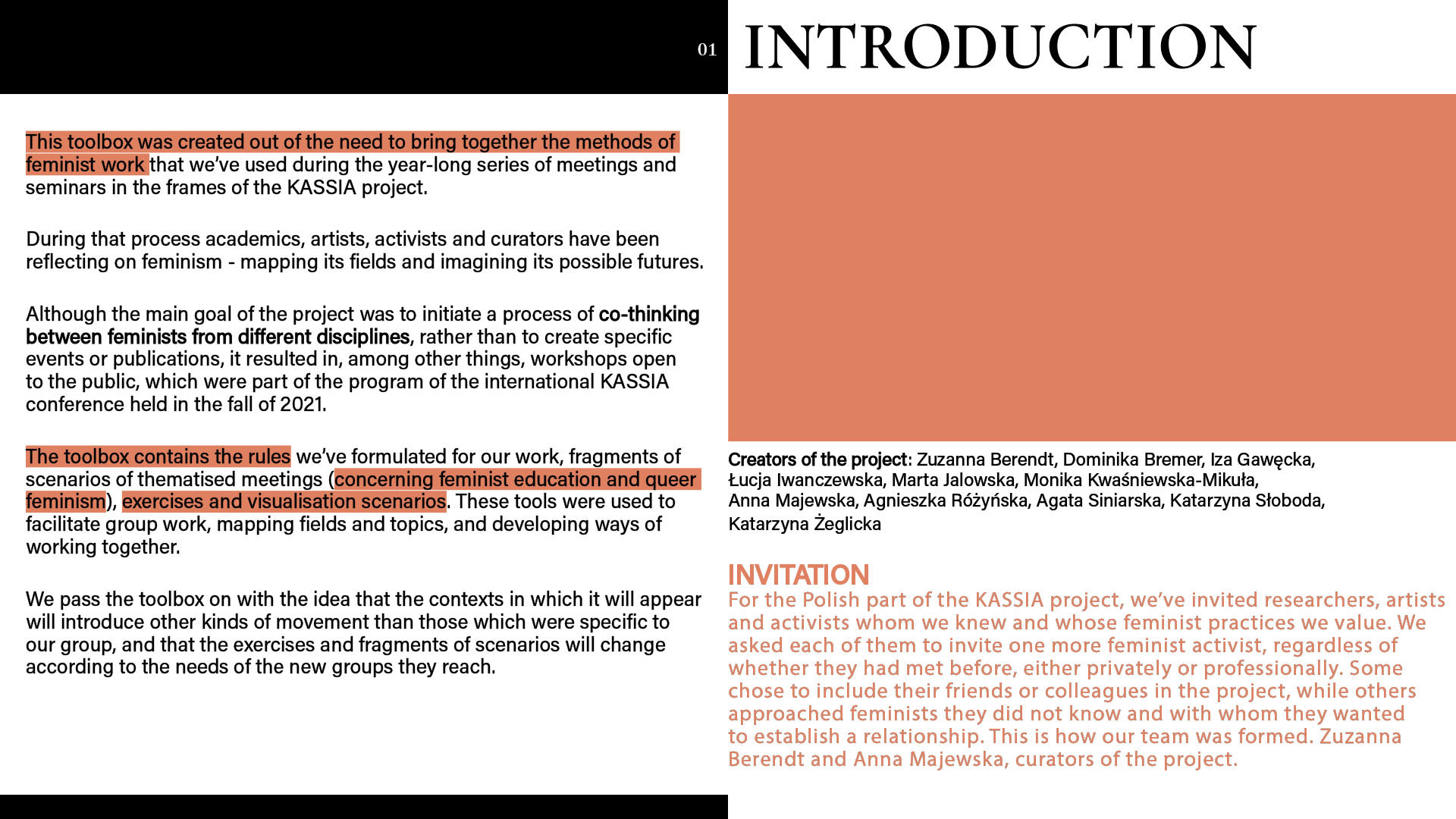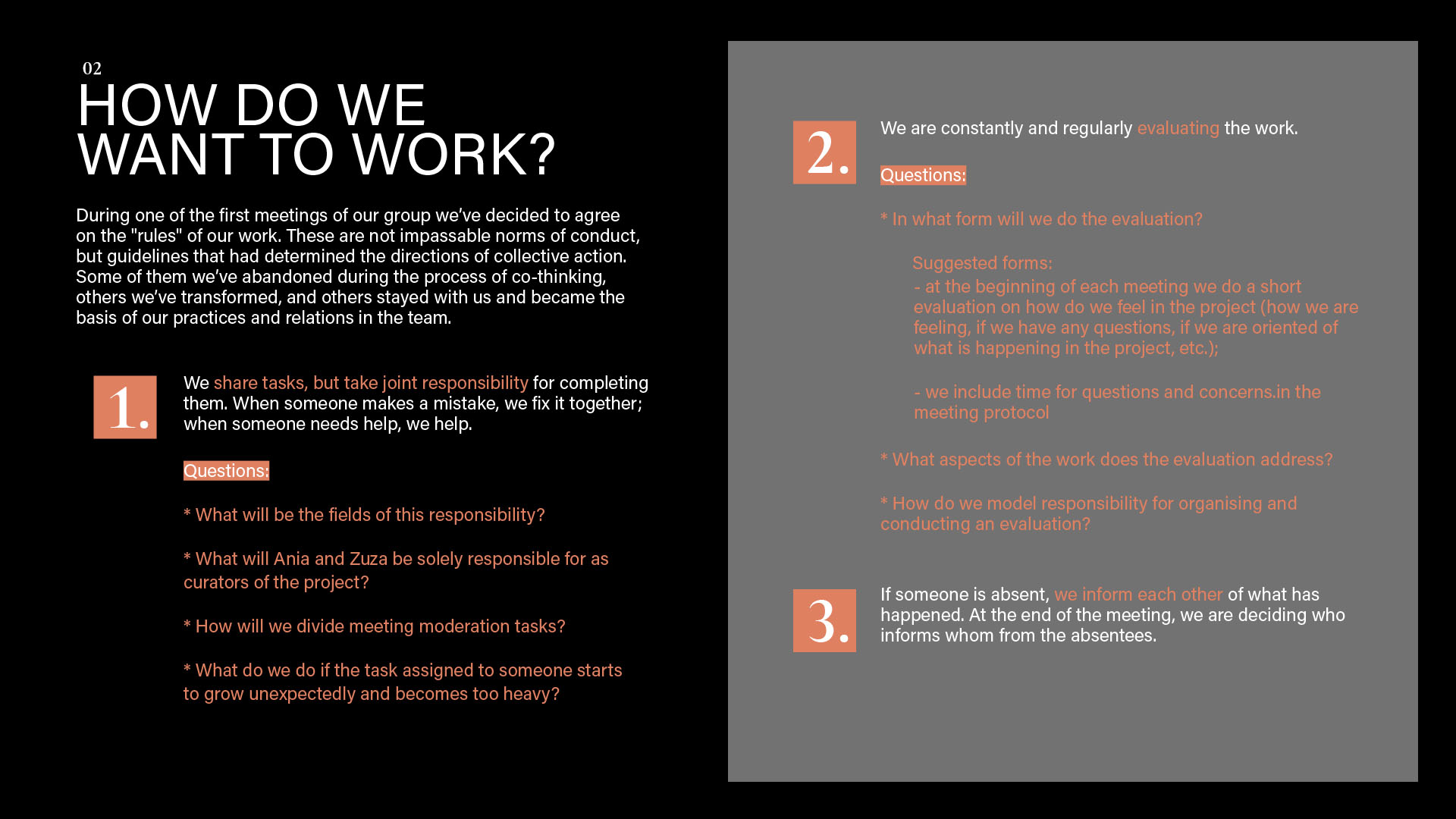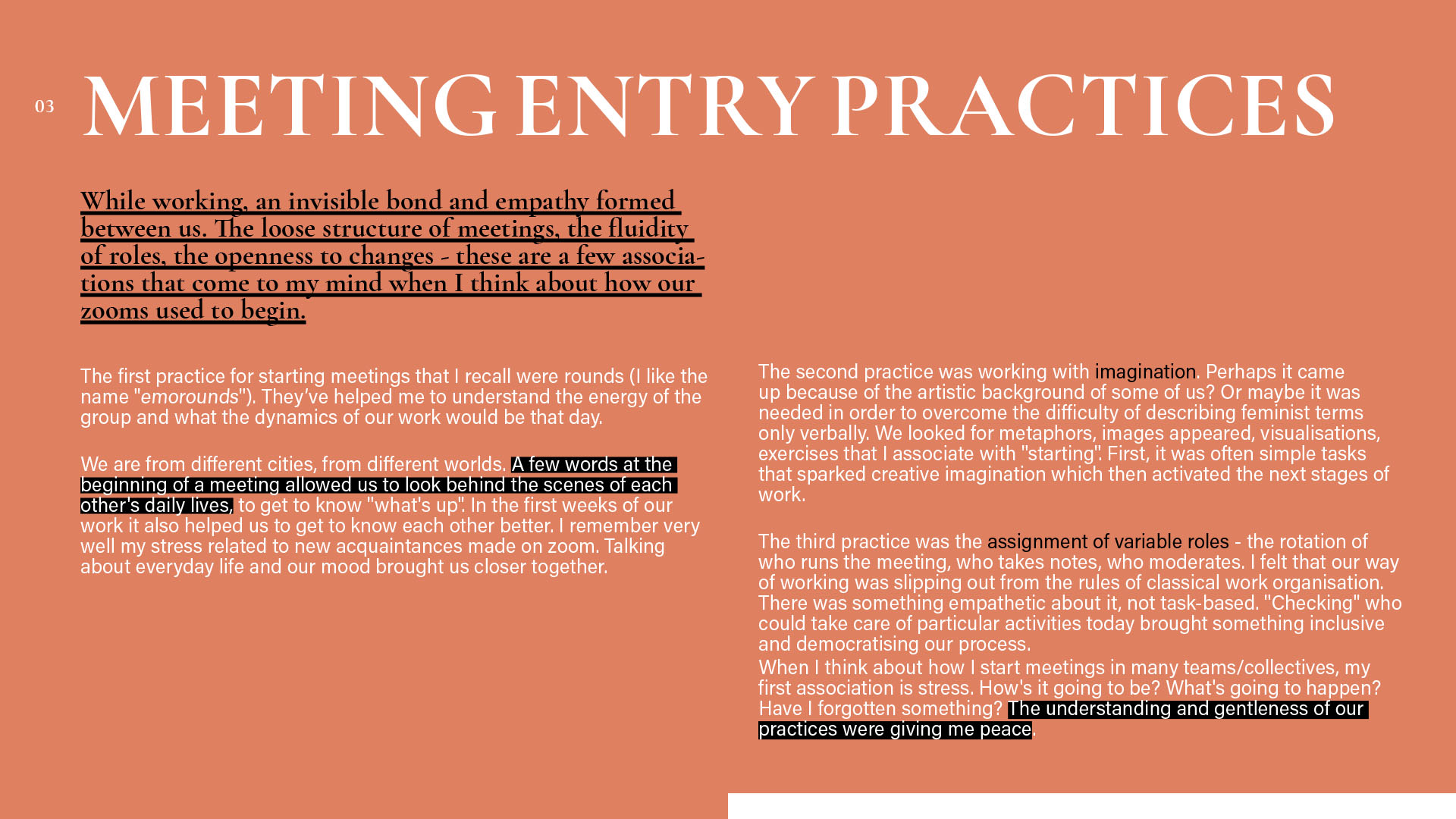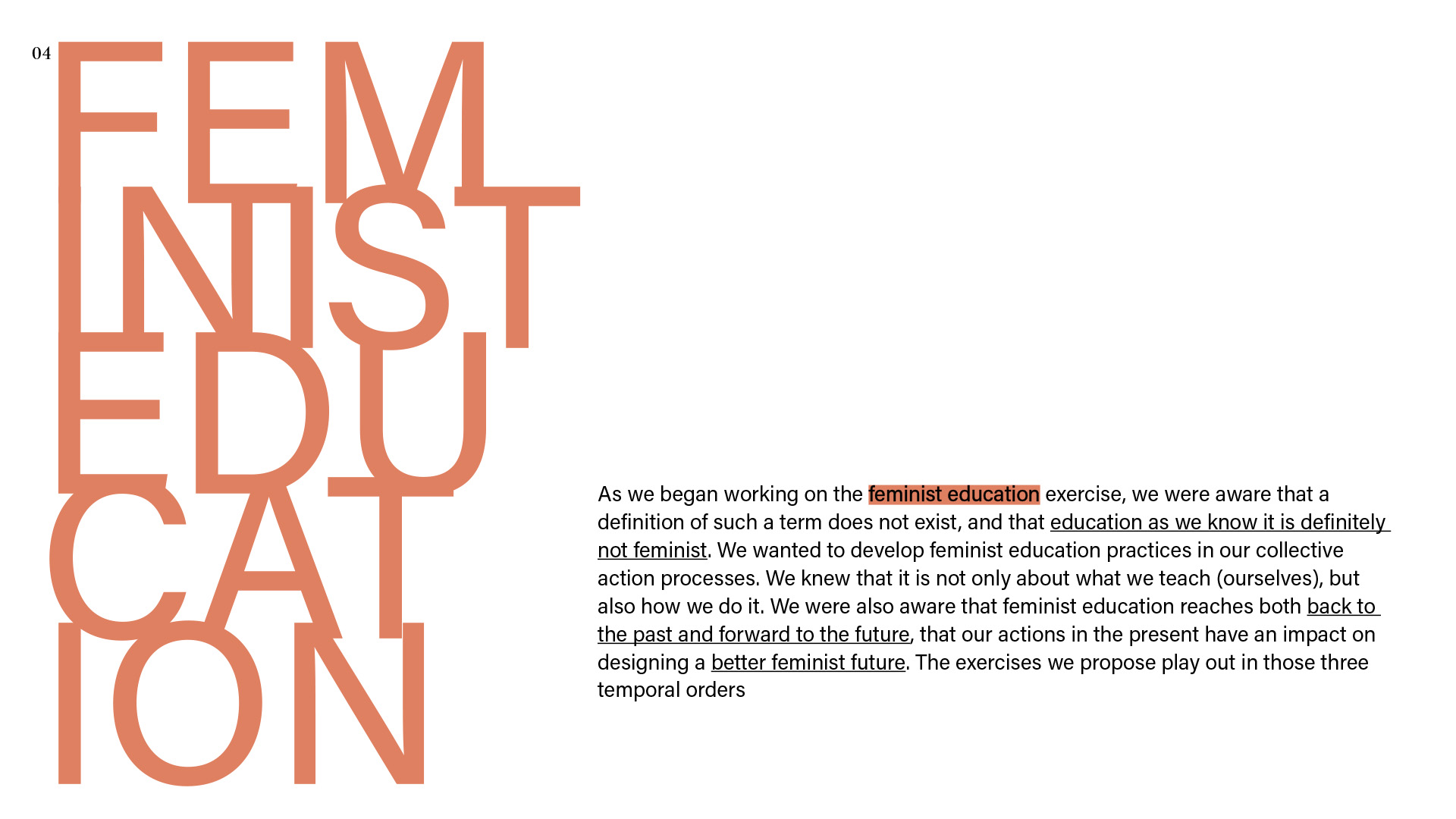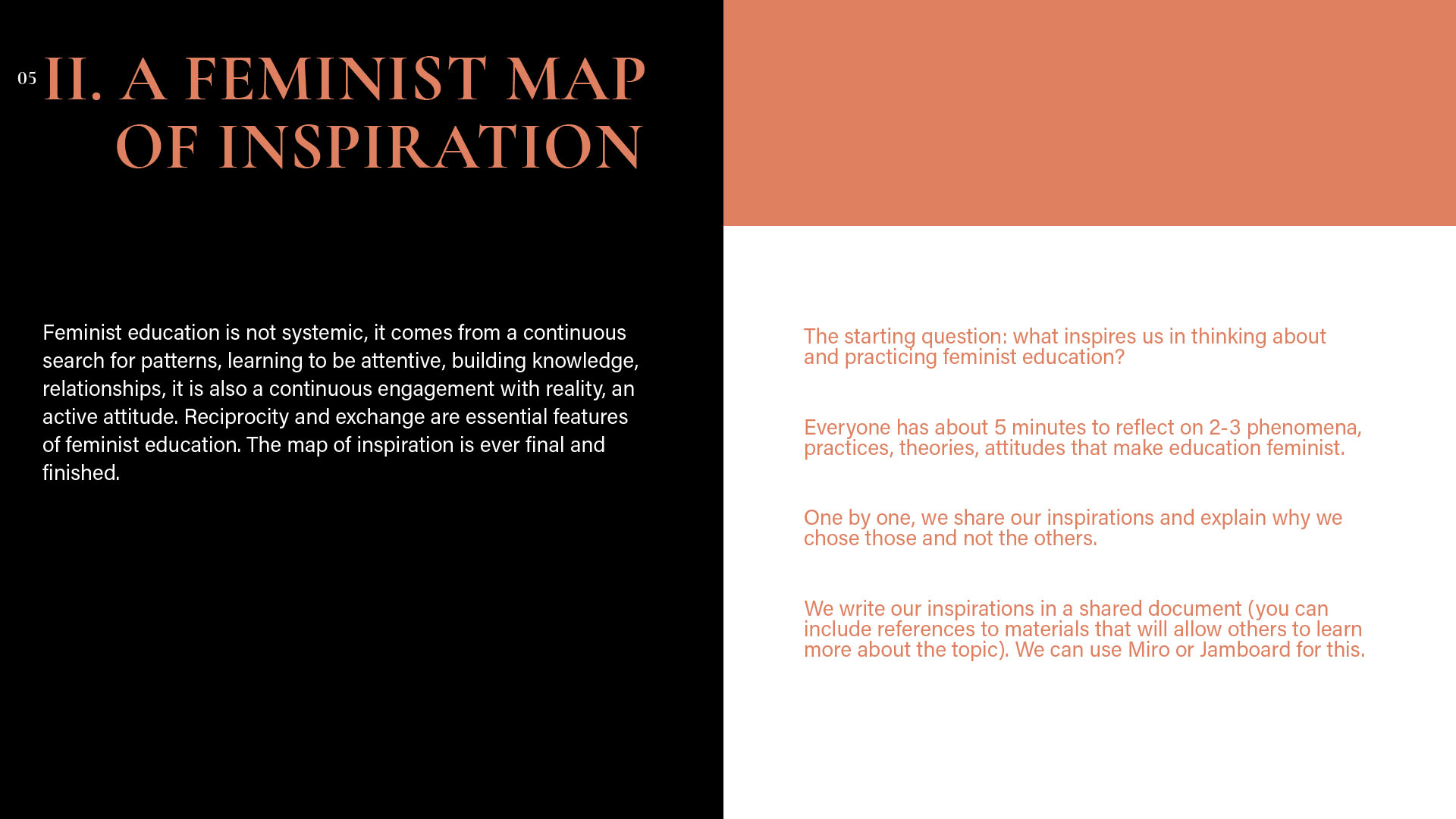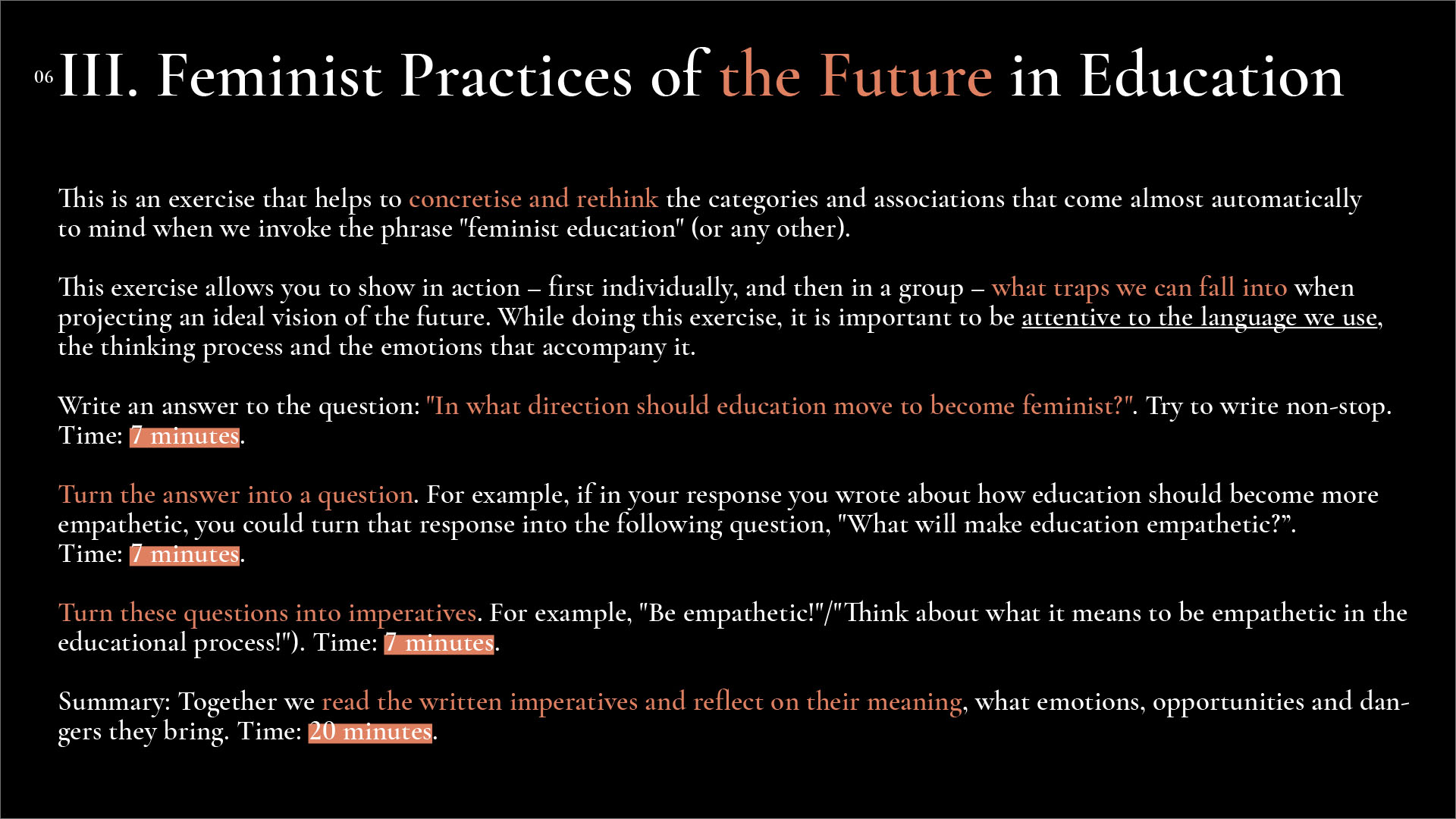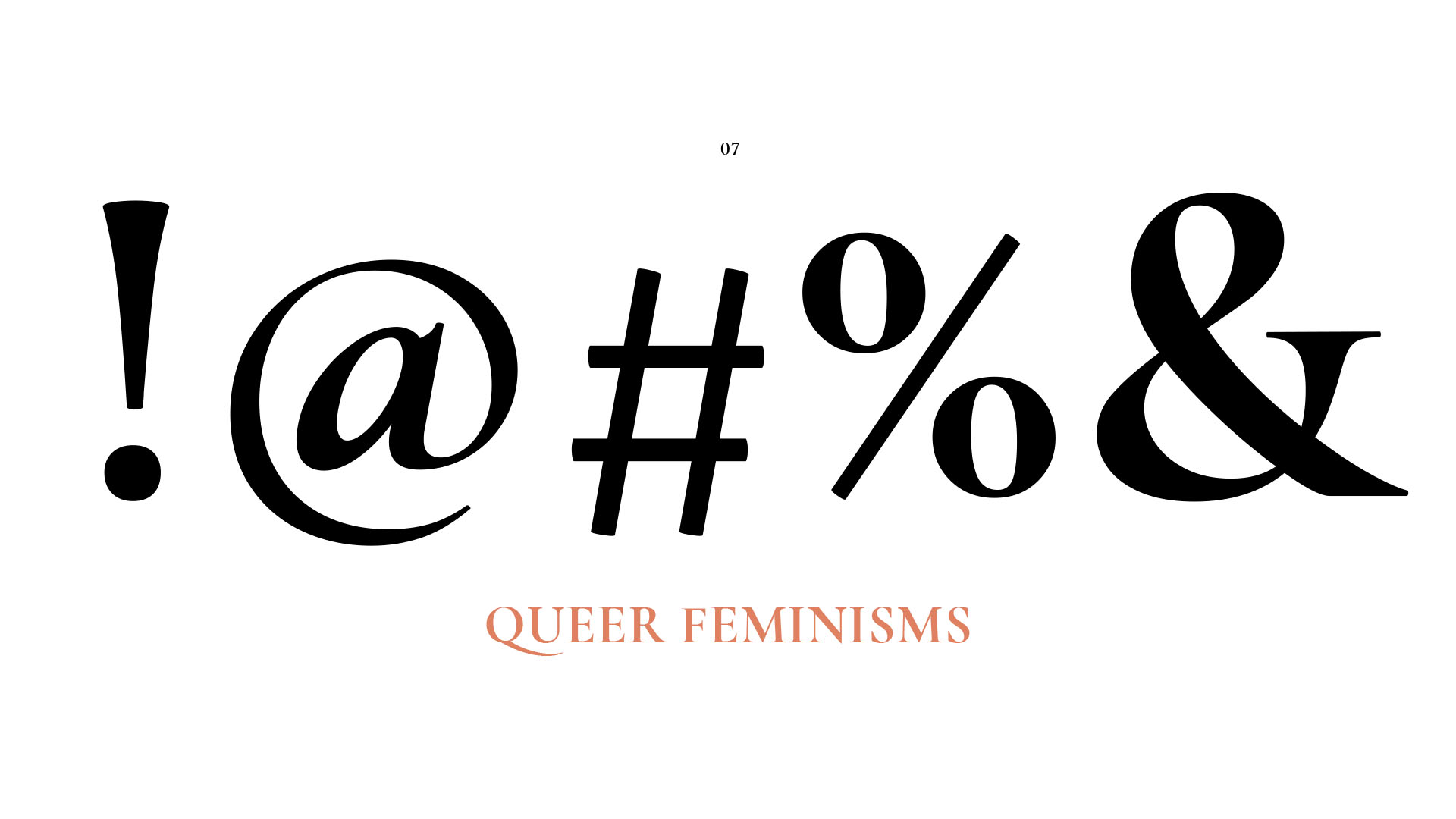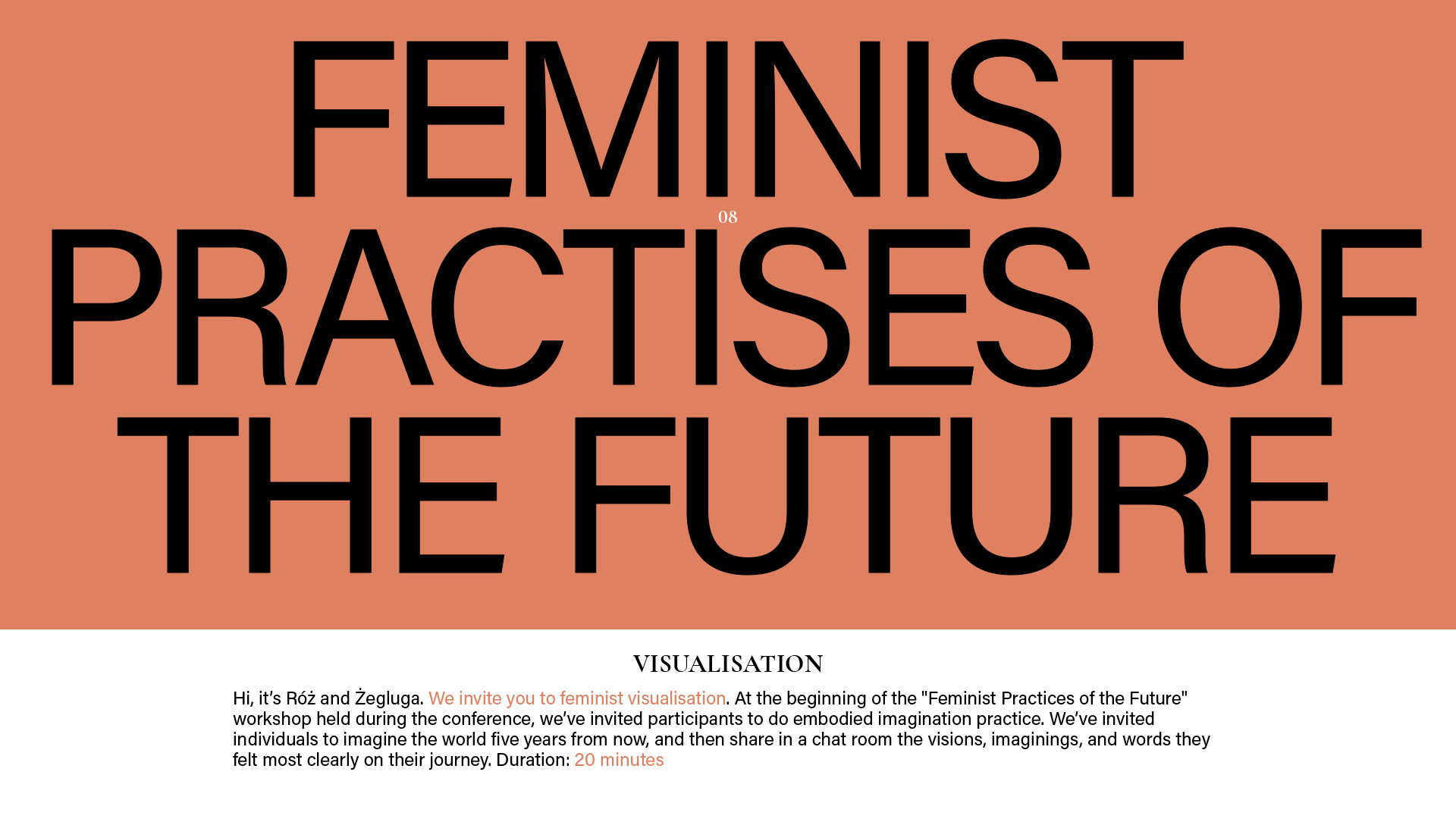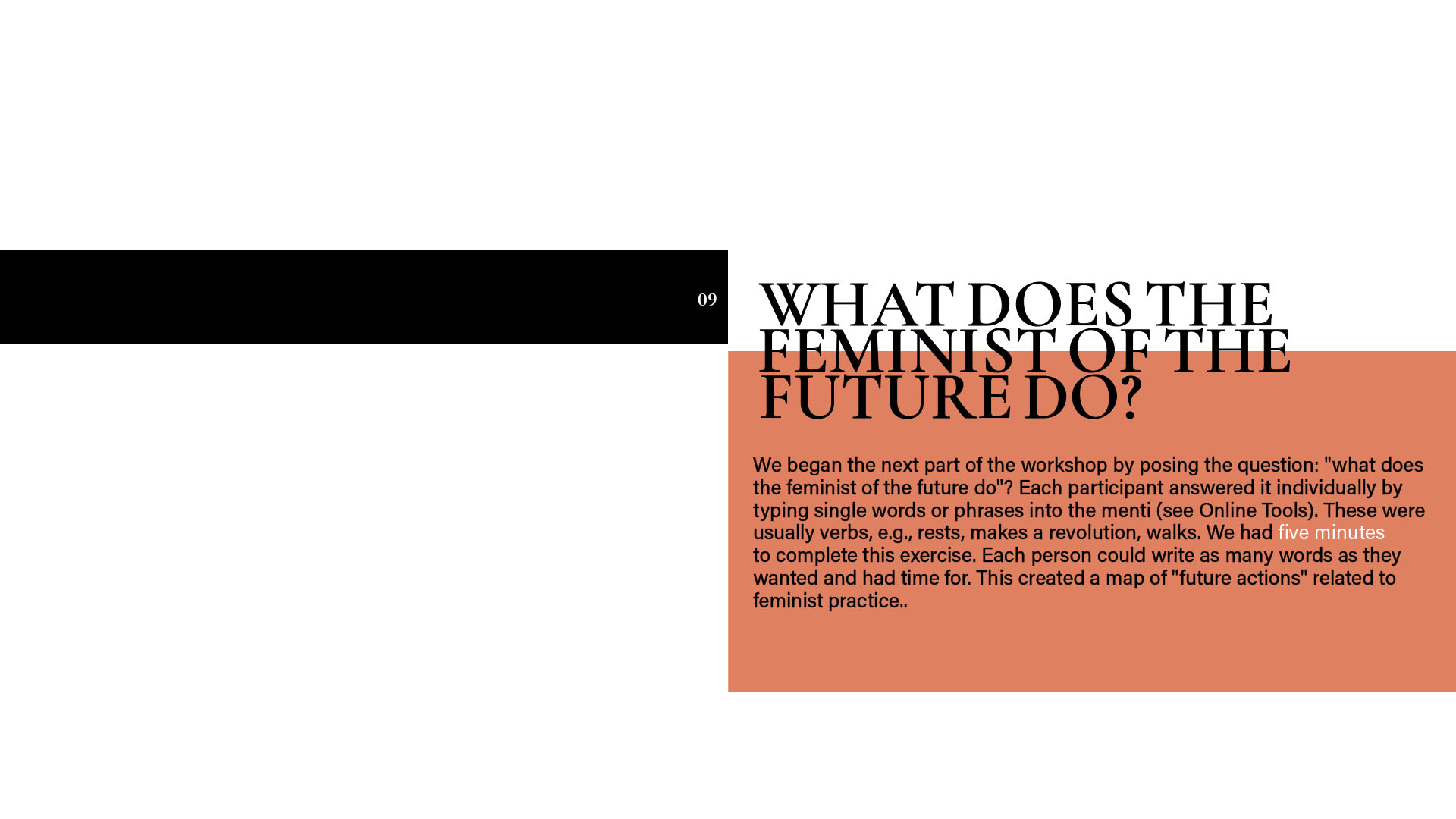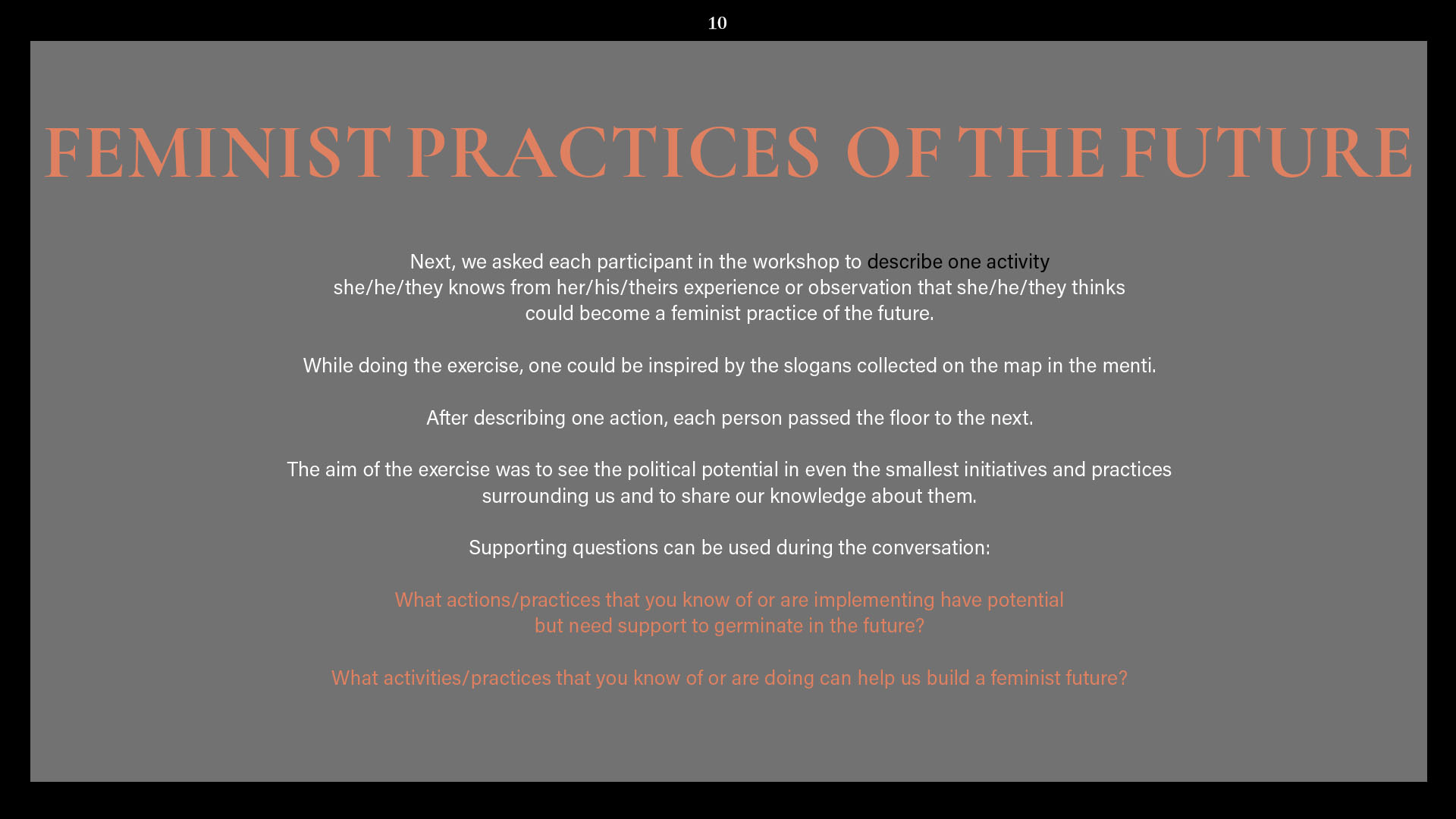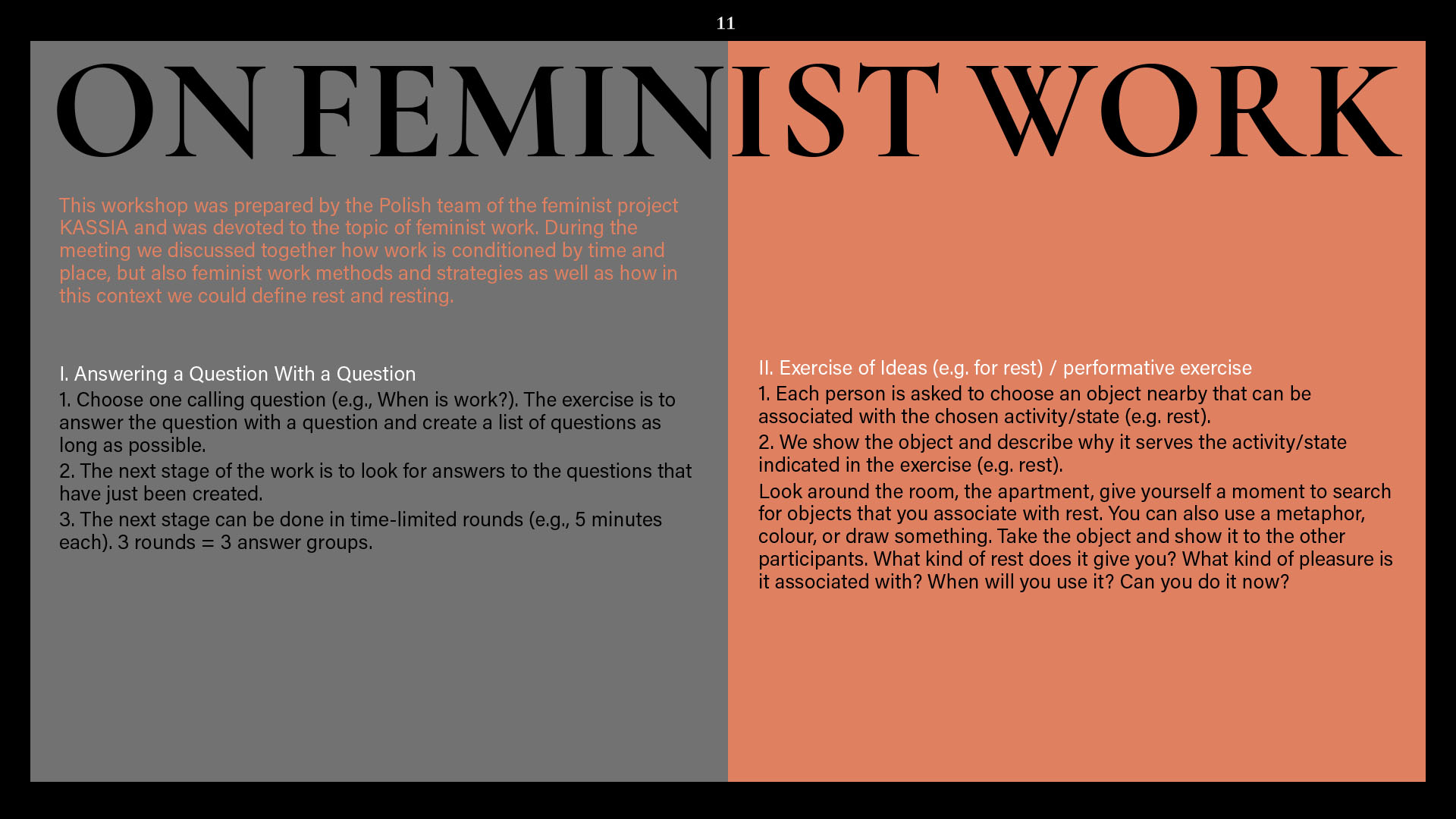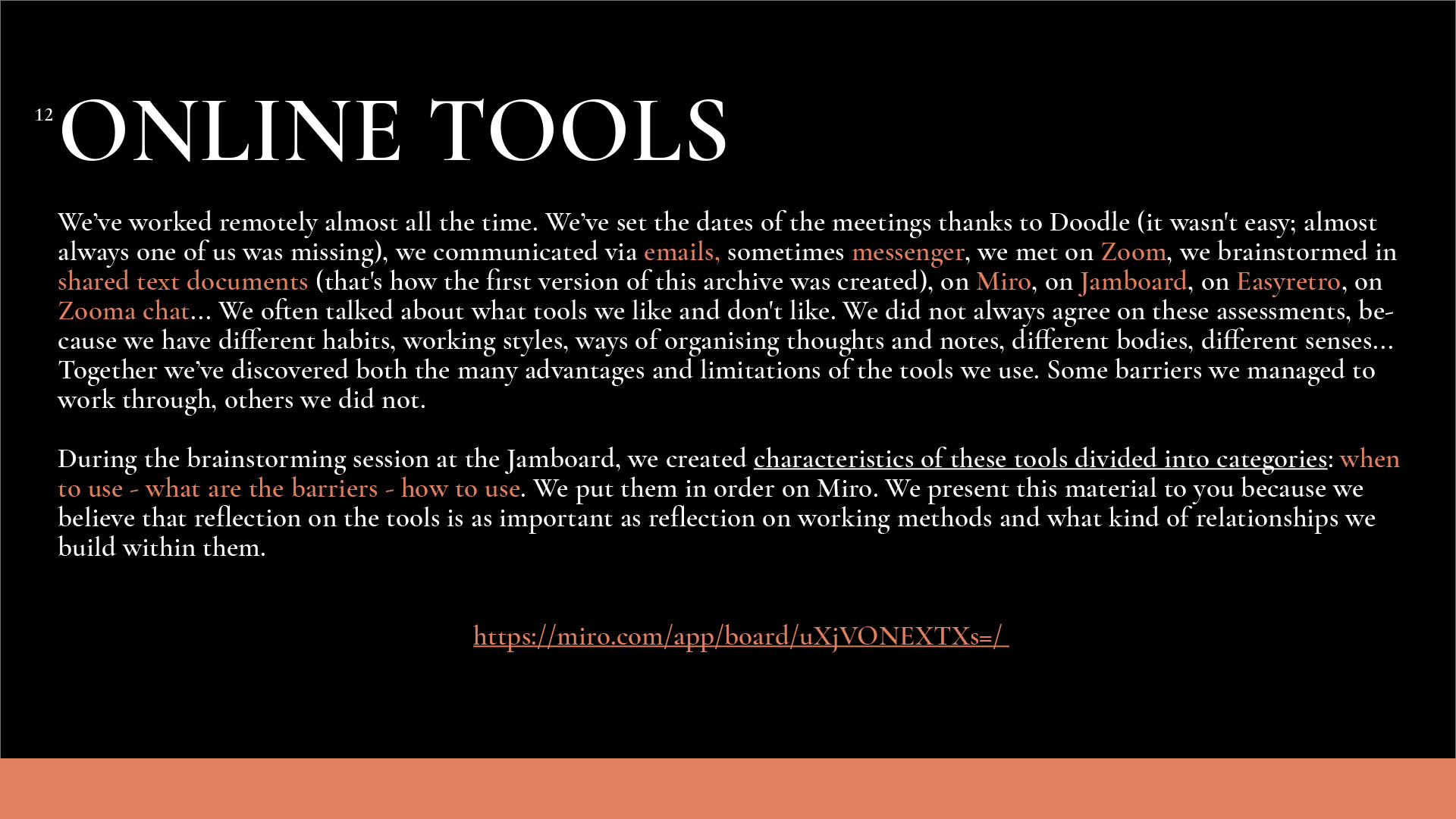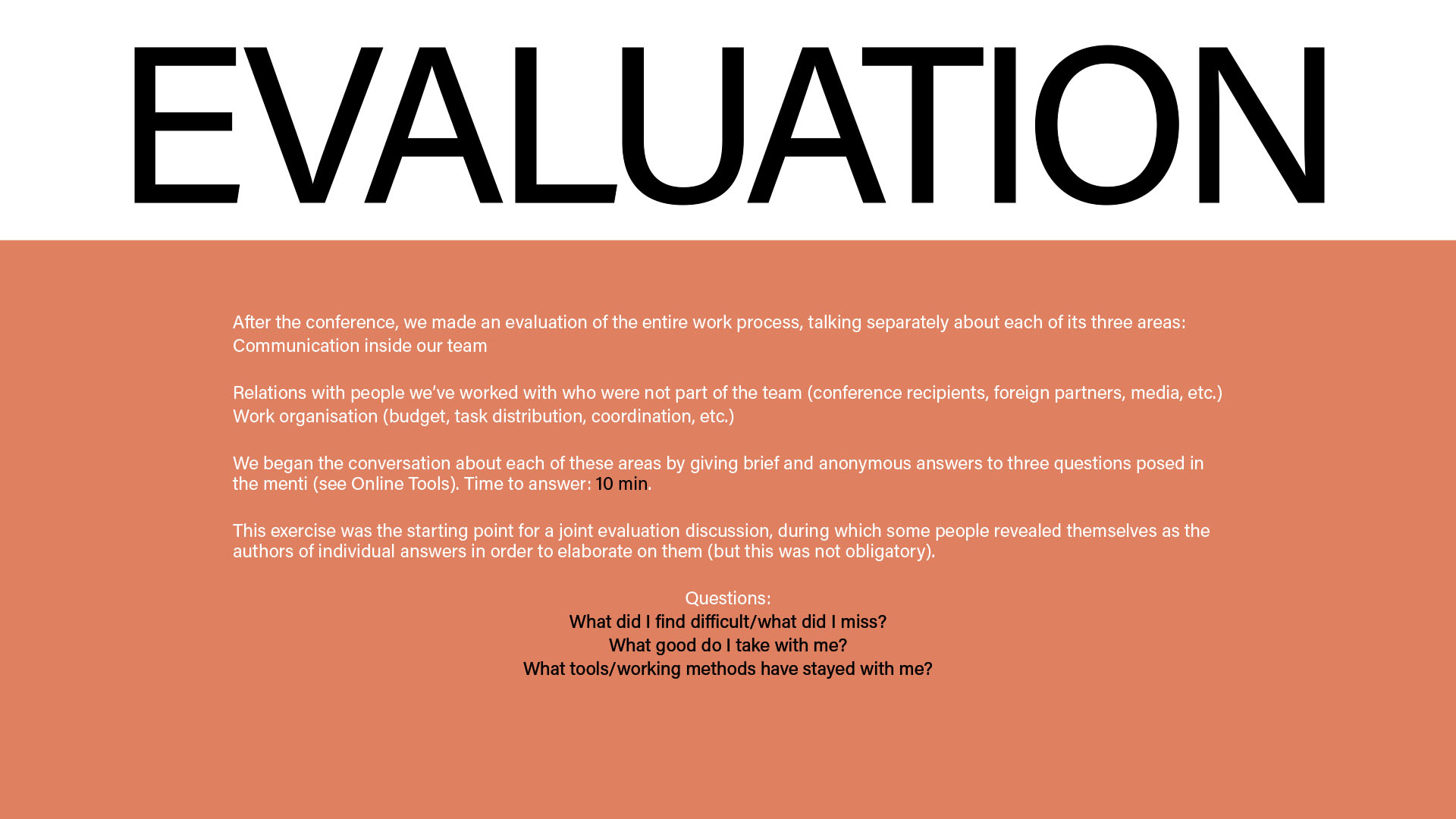COLLECTIVE INTERVIEW / WYWIAD KOLEKTYWNY
The collective interview that we bring to you is an attempt to convey emotions, affects, feelings and thoughts that accompanied our work, and relationships that emerged between us. In the interview – just like in the process of our work – each person is an individual, but their voice makes up our collective voice – not unified, but centered around KASSIA and shared feminist assumptions of the project. Each of us had the chance to ask one question and give one answer. We created a chain in which one person asked a question, a second person answered and sent that answer to a third person, a third person generated a question based on that answer and asked it to a fourth person, the fourth person answered again and sent it to a fifth person, the fifth person created a question and sent it to the sixth person, and so on and so forth until we turned back to the first person and started the circle again. We did two turns around our KASSIA-chain and the questions and answers we sent each other via email could be written down, recorded or illustrated. The first circle took us about an hour and we were then connected to each other at a zoom platform. The second circle took about two days. We recommend a reading strategy that takes into account different temporalities in which various parts of the interview were created.
INTERVIEW PART 1: Agata's question - Iza's answer
Agata: What role does feminism play in your everyday life? / Jaką rolę odgrywa feminizm w twoim życiu codziennym? Iza: Okay, I'll try to record some of my thoughts on everyday feminism. When I think about feminism in general, it's not an obvious identity for me, because I became a vegan very early on, I had this anti-capitalist approach to political issues very early on, but somehow I never encountered feminism when I was growing up. Which is interesting, because I also succumbed to all the stereotypes about feminism and I thought to myself that I fit very well in such a masculine group, I've always stuck with boys and I've always got on well (with them) so feminism for me was always associated with being against men. Yes, in my teenage years I didn't come across any such (feminist) content that appealed to me. I also grew up in a small town in the Lublin region and while ecological themes were popular there, feminism was never present. And then, somehow, naturally, my paths intertwined with the feminist paths and, when I started to think back to my first experiences and thoughts about how I felt as a woman in the society, I remembered that when I was about 13, 14 years old and I read a news about a teenager who was forced by the court to have a baby. She was twelve years old, and it totally hit me then, because at that age of thirteen/fourteen, I totally couldn't imagine how I could have a child. The lack of access to contraception, to abortion, to knowledge about abortion, the abortion compromise, etc. all this filled me with great terror and I have the impression that this fear has accompanied me for a large part of my life, in various situations. And this is why I am a feminist, why I am a feminist every day. It’s mainly because I am often afraid of different situations and the oppression of the system. Gender based oppression. I'm a feminist because I don't want to be afraid and I want to fight for these rights for myself and for others. And I also think that I'm a feminist in my everyday life because I'm surrounded by a lot of awesome chicks and very strong people and this somehow carries me away. Iza: Dobra, spróbuję nagrać trochę moich przemyśleń o feminizmie codziennym. Kiedy myślę o feminizmie, to nie jest dla mnie oczywista tożsamość, dlatego że bardzo wcześnie zostałam weganką, bardzo wcześnie miałam antykapitalistyczne podejście do spraw politycznych, ale jakoś nigdy w wieku dorastania nie zetknęłam się z feminizmem. Co jest ciekawe, bo ja też uległam stereotypom na temat feminizmu. Bardzo dobrze odnajduję się w męskim gronie, zawsze trzymałam się z chłopakami i zawsze się dobrze z nimi dogadywałam, więc feminizm kojarzył mi się z byciem przeciwko facetom. Tak, w wieku nastoletnim nie zetknęłam się z żadnymi takimi treściami (feministycznymi), które by do mnie trafiły. Wychowywałam się w małej miejscowości na Lubelszczyznie i tam, chociaż popularne były ekologiczne tematy, to feminizmu nigdy nie było. A później jakoś naturalnie moje drogi przeplatały się z drogami feministycznymi. Kiedy zaczęłam wspominać pierwsze doświadczenia i myśli o tym, jak się czuję jako kobieta w społeczeństwie, to przypomniało mi się, jak miałam jakieś trzynaście/czternaście lat i przeczytałam newsa o nastolatce, która była zmuszona sądownie do urodzenia dziecka. To była dwunastolatka i wtedy to mnie totalnie uderzyło, bo mając te trzynaście/czternaście lat, zupełnie sobie nie wyobrażałam, jak mogłabym mieć dziecko. Ten brak dostępności do antykoncepcji, do aborcji, do wiedzy o aborcji, ten kompromis aborcyjny i tak dalej, to wszystko mnie napawało ogromnym przerażeniem i mam wrażenie, że ten strach towarzyszył mi przez dużą część życia, w różnych sytuacjach. I to jest to, dlaczego jestem feministką, dlaczego jestem feministką codziennie. Głównie dlatego, że często się boję różnych sytuacji i opresji systemu. Opresji ze względu na moją płeć. Jestem feministką dlatego, żeby się nie bać i żeby walczyć o te prawa dla siebie i dla innych. No i myślę sobie też, że jestem w życiu codziennym feministką, bo otacza mnie mnóstwo zajebistych lasek i bardzo mocnych osób i to jakoś mnie niesie. '
Mushroom Underground:
INTERVIEW PART 2: Zuza's question - Monika's answer
Zuza: How do you practice feminism in family relationships? / Jak praktykujesz feminizm w relacjach rodzinnych? Monika: I try to take care of communication, which is difficult because everyone needs a slightly different kind of speech to understand well what I want to tell them. For that you need time. I don't have much of it, but I really care about organising common moments. It helps to have rituals that organise our daily being together. But also talking about what we need, what needs changing. I try very hard to think about how I express emotions, because the closer you are, the more you can hurt yourself. We make decisions together about what we share. All that I write here (and all that I haven't managed to write about) is the hardest daily life practice I have/know.
Mushroom Underground:
INTERVIEW PART 3: Dominika's question - Żegluga's answer
Dominika: What does it mean to care for each other in a relationship? / Co to znaczy dbać o siebie nawzajem w relacji? Żegluga: To listen to yourself To give space, stroke and cuddle when needed To make coffee and delicious food To wrap up with a blanket and keep warm with a thermophore, To be a sister and a witch To take you on a unicorn ride To be
Mushroom Underground:
INTERVIEW PART 4: Marta's question - Łucja's answer
Marta: What does being a feminist person mean to you? / Co dla Ciebie znaczy bycie osobą feministyczną? Łucja: For me, being a feminist person means first and foremost being... And that means, being thoughtful, considerate, fair to myself and others, knowing my needs and boundaries. Being brave and allowing myself to feel fear. Being brave and giving myself permission to be weak or weakened. Being a feminist person allowing myself to be in relationships t hat are good for me and creating relationships that can be good for others.
Mushroom Underground:
INTERVIEW PART 5: Róż's question - Ania's answer
Róż: What actions/practices are most valuable for building a feminist tomorrow? / Jakie działania/praktyki są najcenniejsze do budowania feministycznego jutra? Ania: It's hard for me to answer that question because there are no practices that will work in all circumstances. But there are practices which can be very powerful in a specific place, time, circumstances, for specific groups and people (human and non-human). Tonight I am exhausted and it seems to me that during KASSIA the closest I came to the feminism of the future was when we tried to work together on strategies for resting and experiencing pleasure. I still don't know how to do it, I feel guilty when I rest and my precarious situation mostly doesn't allow it. Maybe that's why I think care - for myself and others - is a knotty issue for the feminism of the future.
Mushroom Underground:
INTERVIEW PART 6: Kasia S's question - Agata's answer
Kasia S.: What is rest for you? / Co jest dla Ciebie odpoczynkiem? Agata: I rest when I walk. And I walk a lot, usually in a steady rhythm. I walk and listen to the space, I perceive it, feel it and give my time to it. I finish when I want to, not when I have to. And I do all this while drinking coffee, taking sip after sip, feeling each sip flow through my throat into my stomach. I then imagine the coffee flowing through my veins - it's that moment when I feel myself relaxing.
Mushroom Underground:
INTERVIEW PART 7: Iza's question - Zuza's answer
Iza: What pleasures did our collaboration give you? / Jakie przyjemności dała Ci nasza współpraca? Zuza: Lately, for my own use, I have started to make a distinction between those things that give me pleasure and those that give me satisfaction, although satisfaction is also related to pleasure, so it is not that simple. Pleasure is for me a very specific mode of experiencing reality and in our work there was a lot of it for me and it was separated from those moments which should bring satisfaction, for example when we managed to do something or when some bigger stages of the project were closed and we could say that they finished well or even that they were successful (although this word is also subversive). It was a pleasure to be with you and to have those moments when we would get away from work and from what was planned for a given meeting and we would start talking about how we could help someone or talk about things that were somehow important for us at that time when we were together. I think it was a kind of friendly coexistence, and friendships are for me the most important relationships that exist and in the context of feminist action they are absolutely crucial.
Mushroom Underground:
INTERVIEW PART 8: Monika's question - Dominika's answer
Monika: If you would like to share this, I would like to ask if there was something that was difficult for you during our working together and how did you cope with it? Or if you prefer more generally: what methods do you have of dealing with difficulties arising during the work? / Jeśli chcesz się tym podzielić, to chciałabym zapytać, czy było coś, co sprawiało ci trudność w czasie naszej współpracy i jak sobie z tym radziłaś/radziłyśmy? A jeśli wolisz ogólniej: jakie masz metody radzenia sobie z trudnościami pojawiającymi się w czasie współpracy? Dominika: At the very beginning of the project, when we were all getting acquainted with the issues we were going to discuss, the way of working, the kind of cooperation with kainkollektiv, etc., there were moments when I was afraid of my competences – that I didn't know enough, that I wouldn't find myself in the discussed contents. After one conversation with Anna and Zuza, these fears disappeared. Then I had difficulties understanding everything and keeping up with everything we were working on. This was largely due to my busy life and the difficulties I was experiencing at the time. If I didn't know something, I would contact one or two people from the project to ask around, talk things through, figure things out. That helped a lot. Meetings in smaller teams also helped (for example, when working on a meeting about feminist education). My doubts and difficulties appeared less and less frequently later on, as we got to know each other better. I myself managed to believe that my presence is valuable in a group of extremely interesting, beautiful, good and valuable people. I am incredibly grateful to have met you, because I think that the kind of collaboration we experienced made me feel more confident (this is my personal thanks). I think that's the power of sisterhood.
Mushroom Underground:
INTERVIEW PART 9: Żegluga's question - Marta's answer
Żegluga: What will you keep from KASSIA to yourself and what will you pass on to others? / Co zostawisz sobie z KASSI i co przekażesz innym? Marta: From KASSIA I will keep friendships and bonds and....I will also leave myself with a group of experts whom I have met here, with whom I can work and who I can also ask for support. But from KASSIA I also take... the ability to ask for support, which I did not have before and a lot of courage. Courage to share my practices and proposals, but also to ask for other people's practices and proposals. Sometimes I thought I couldn't ask about some things, and now it seems to me that I can ask about many things and that many people also want to support me with their knowledge and their practices. But they don't have that chance because I don't ask, or other people don't ask. I think that what I want to pass on to others, and what I have already started to do, is another way of breaking down the structures and the system in which we function in art, in science, in theatre. I've learnt a lot here and I can translate and use it all. I've been given a lot of tools. I can also invite people so that the practice they shared in KASSIA can also be a practice that they will share with other people that I will come into contact with in my work. And then we will share together. But I think it also brought something back to me that I'd kind of forgotten about, which is that whatever stage I'm at in my journey, it's something that I can learn and share with other people, wherever they are. Sometimes it was easy for me to get lost in the fact that at thirty-something I should already be somewhere I'm not currently. But thanks to KASSIA, I also think a lot about the fact that I am here where I am and that is what I can share with other people. Yeah. And I also take a lot of patience in scheduling large group meetings. TEXT ADDENDUM: Though in all, I could enumerate all day, using different languages and discourses, because in each of them KASSIA leaves me with something different. And one more thing: the word 'affects'. Doesn't 'KASSIA' read 'AFFECTS' from the back?
Mushroom Underground:
INTERVIEW PART 10: Łucja's question - Kasia's answer
Łucja: When building/creating relationships – private, professional, with the landscape, nature, each other/the Other, there will be something in them (feeling, practising, looking, listening, giving answers) that you have experienced in the process of our work in KASSIA? Czy kiedy będziesz budować/tworzyć relacje – prywatne, zawodowe, z krajobrazem, przyrodą, każdą/każdym, Inną/Innym – będzie w nich coś (uczucie, praktyka, spojrzenie, słuchanie, dawanie odpowiedzi), czego doświadczyłaś w procesie naszej pracy w ramach KASSII? Kasia S.: What has stayed with me from our collaboration is a certain softness and gentleness in my expectations of the people I work with and the end result. What I have observed so far in idealistic conversations and texts in choreographic (or more broadly artistic) practices, that it is the process and not the product that counts, has permeated my everyday life both in professional work and in private relationships. I try to listen more, to understand different perspectives and needs, different temporalities, approaches, boundaries, endurance. To be more understanding to others and myself, to give myself and others more time and space.
Mushroom Underground:
INTERVIEW PART 11: Ania's question - Róż' answer
Ania: In what time(s) and space(s) does KASSIA operate? / W jakim czasie/czasach i przestrzeni/przestrzeniach działa się KASSIA? Róż answers… Agata generates a question from Róż’s answer and passes it to Iza….the third circle starts…and another and another….
